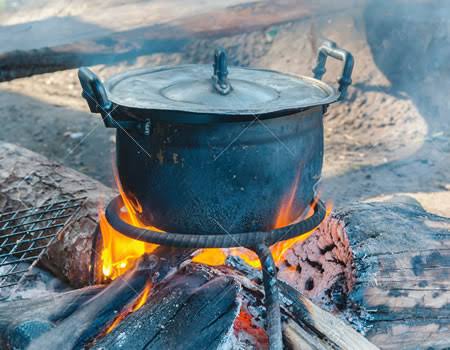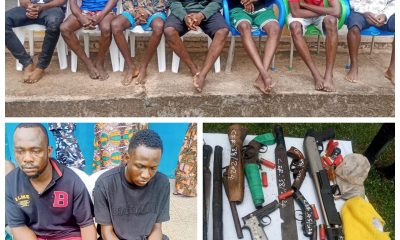Feature
Pelumi Nubi’s London-to-Lagos journey and West Africa’s border realities

Pelumi Nubi’s London-to-Lagos journey and West Africa’s border realities
By Mark Longyen & Tosin Kolade
When travel content creator Pelumi Nubi embarked on her 68-day solo journey from London to Lagos a few months ago, little did anyone anticipate the beauty, excitement, and challenges that would unfold.
She embarked on a journey from London through France, Spain, and Morocco before venturing into the West Sahara Desert.
From there, she continued her expedition through Mauritania, Senegal, The Gambia, Guinea-Bissau, Guinea, Sierra Leone, Liberia, Mali, Burkina Faso, Côte d’Ivoire (Ivory Coast), Ghana, Togo, Benin, and on the other end arrived in Lagos, Nigeria on April 7.
Pelumi made history as the first black woman to complete a solo drive from the United Kingdom to Nigeria, garnering accolades and recognition worldwide for her remarkable achievement.
Fans greeted her arrival with cheers, having closely followed her journey online.
In recognition of her extraordinary feat, the Lagos State government bestowed upon her a new car, a house, and an ambassadorship for state tourism.
While the journey progressed, the solo trip revealed the beauty, culture, and traditions of all the countries she visited.
However, a major highlight was the difficulty and delay in moving past the West African borders as a British-Nigerian citizen with the required travel documents.
Different passport checks, attitudes of border security officers, and seemingly deliberate delays, were shown on her social media page, Instagram, with millions of viewers.
According to Pelumi, she hopes to use her platform to create an awareness campaign for improving freedom of movement for people in the African region.
Pelumi is not alone in the narrative about the frustrating and agonising road-travelling experiences on the borders of member states by ECOWAS citizens.
Doris Brown, Deputy Secretary-General, Lions Club District 40382, comprising Liberia, Sierra Leone, Ivory Coast, and Togo, who experienced the same, urged Customs and Immigration officers to treat ECOWAS citizens, who cross the sub-regional borders by road with dignity and respect.
Like Pelumi, she said that 29 of the club’s members, while traveling to Togo by road from Liberia through Ivory Coast, and Ghana for their district convention, were subjected to agonizing hours of delays due to relentless searches at checkpoints.
According to her, by the ECOWAS protocols, people should travel freely without taking a visa from member states, as ECOWAS Heads of State have signed the protocols, so people should not be treated “inhumanly as if we came from space.”
“ECOWAS needs to have a second look at the relationship between its member states, especially with the ordinary citizen who embark on a journey by road.
“Each member state needs to ensure security, but as ECOWAS citizens, they should be accorded some respect and dignity.
“These were not part of the dreams of the founding fathers of ECOWAS for the ECOWAS citizens and Africa as a whole. If we cannot be respected at our borders and ensure free movement, what is the reason for having ECOWAS?” Brown queried.
Critics say that in spite of the signing of the African Continental Free Trade Area (AfCFTA) and the ECOWAS protocol on the free movement of persons and goods, challenges persist regarding the free movement of people and goods in the West African sub-region.
The free trade agreement, brokered by the African Union (AU) and signed in Kigali, Rwanda on March 21, 2018, aims to establish a single market for goods and services in Africa, promote the free movement of people, and drive economic growth and development across the continent.
With 54 signatories, the AfCFTA is the largest free trade area by member states after the World Trade Organisation, encompassing over 1.3 billion people and vast geographic regions.
It envisions provisions for visa-free travel, residency rights, and the absence of movement barriers, enhancing economic integration and regional cooperation.
While policymakers see labour movement as crucial to the success of the continental free trade agreement, not all African countries fully support the idea.
Additionally, alongside the AfCFTA agreement and the Kigali Declaration, 30 African nations signed the Protocol on Free Movement of Persons, aiming to establish a visa-free zone within AfCFTA countries.
The ECOWAS protocol on the free movement of goods and people promotes regional integration and economic progress among its member states.
The Protocol on Free Movement, Right to Residency, and Establishment, mandates member-states to allow ECOWAS citizens with valid documents the right of entry into their territories under the provisions of the protocols.
ECOWAS member states are also required to adopt measures to ensure that ECOWAS citizens enjoy to the full the rights granted in the Protocol.
Dr Matthew Ogali, a researcher from the Department of Political and Administrative Studies at the University of Port Harcourt, highlighted one of the objectives of ECOWAS as promoting trade and commerce among member countries.
He identified various institutional and non-institutional barriers hindering the free movement of people and goods, such as excessive customs checks and entry restrictions.
According to him, after forty-nine years of existence, ECOWAS has primarily thrived in the informal trade sector, characterised by small-time entrepreneurs conducting business across borders with minimal adherence to established trade policies.
Ogali noted that this informal trade environment has also fostered criminal activities like smuggling and cross-border armed banditry, resulting in significant losses of goods and, at times, lives.
“Despite its resilience over the past forty-nine years, ECOWAS has struggled to translate many of the documents produced by its intellectual community, often seen as scholarly discourse, into practical policy implementations.
“This gap between academic insights and policymaking poses challenges for addressing the region’s problems effectively.
Prof. Charles Ukeje of the Department of International Relations, Obafemi Awolowo University, OAU, Ile-Ife, while commenting on Pelumi’s experience at the borders of ECOWAS countries, said her challenges may have been unrelated to any deficiencies in the ECOWAS protocol on the free movement of its citizens.
He said: “One would not know whether she was carrying a British passport or a Nigerian/ECOWAS passport during the trip, which would have guaranteed her free movement, or otherwise, within the subregion in line with the ECOWAS protocol.
“Also, we need to know whether the passport she carried had expired or was invalid at the time she was traveling, which may have necessitated scrutiny by security officials at the borders.”
Corroborating Prof. Ukeje’s view, ECOWAS Director, Free Movement of Persons and Immigation, Albert Siaw-Boateng, said that the delay experienced by Pelumi at the points of entry or exit could not be attributed to any weaknesses in the implementation of the protocol.
He said that due to the prevailing security challenges in the region, triggered by terrorism and violent extremism, ECOWAS’ security architecture necessitated thorough checks on travelers by security officials without impeding the free movement of community citizens within the region.
According to him, the protocol also gives room for National Laws to take precedence, hence, there are inconsistencies in the implementation of the protocol by individual member states.
“It is also to be noted that even though all member states have signed up to the Free Movement Protocol, it gives room for National Laws to take precedence.
“In this regard, there are inconsistencies in the implementation of the protocol by Member States.
“So, any delay at the point of entry or exit cannot be attributed to weaknesses in the implementation of the protocol,” he said.
Dr Omar Touray, President of the ECOWAS Commission, speaking on the Free Movement Protocol recently, noted that: “Free Trade moves with Free Movement of persons and goods.”
ECOWAS Commission Headquarters, Abuja.
Touray said that ECOWAS had been implementing joint border posts, which brought together border officials of two neighboring countries to carry out joint operations, to ease cross-border crossing, which sometimes took cognizance of respective member states’ laws.
“We have built a joint border between Nigeria and Benin at the Seme-Krake border, and between Togo and Ghana at the Noepe-Akanu border. These border posts are now operational.
“There is another border post that has been made operational between Nigeria and Cameroon at the Ekok-Mfun area. This was financed by the African Development Bank,” he said.
The creation of the ECOWAS protocol on the free movement of persons and goods on May 29, 1979, to facilitate a borderless ECOWAS, is a cardinal scheme of the bloc’s integration programme, aimed at moving from an ECOWAS of states to ECOWAS of people.
The Protocol adopts the removal of roadblocks and security checkpoints on intra-ECOWAS international highways, the introduction of a single ECOWAS passport, and a Schengen-type visa for the community’s citizens, among others.
Experts say this has fostered regional integration and development by boosting citizens’ mobility, which has yielded multi-sectoral benefits and contributed to key developments in the ECOWAS subregion.
They emphasise that effective policy implementation and addressing institutional barriers will fully realise the benefits of regional integration in West Africa.
Pelumi Nubi’s London-to-Lagos journey and West Africa’s border realities
Feature
Nurturing Boy-Child to Save the Girl-Child

Nurturing Boy-Child to Save the Girl-Child
By Vivian Ihechu
In most cultures, especially in Africa, preference to the boy-child has strong cultural, religious, legal and of course, social status.
This is principally because a male heir is needed to continue the family line.
The boy-child, faced with many challenges, especially in the 21st century, is often times not properly guided; hence the society tends to be losing him.
The African Charter on the Rights of the Child defines a child as anyone below the age of 18; hence a boy-child is a male offspring below the age of 18 years.
Unlike the boy-child, the girl-child has received massive campaign for her rights and protection, with increasing mainstream attention in public health care from the early 2000s.
While several initiatives to protect the female gender have continued to emerge, those for the male are sparse.
The female-centered initiatives include, inter alia, the International Day of the Girl Child, and UN’s coordinated International Conference on Population and Development (ICPD), Cairo in 1994, and the 1995 Beijing Conference that highlighted concerns on women and girls’ empowerment and autonomy.
The initiatives also include laws and regulations against women trafficking and application of criminal laws to under-age sex, child-brides, and sex work
However, it is worthwhile to note that all children are future leaders of tomorrow and custodians of the future.
As such, the first aim of every family and society should be to raise healthy and productive individuals who are physically, psychologically, society and mentally well developed.
Analysts say that neglecting issues affecting the boy-child sets foundation for unbalanced male adult especially as he is the “father’’ of tomorrow, taking charge of families and females who leave their birth families after marriage.
Recognising the importance, the United Nations in 2018, adopted May 16 every year as the International Day of the Boy Child.
It was championed by Dr Jerome Teelucksingh, a university lecturer from the Republic of Trinidad and Tobago.
The day focuses on boys and their well-being, their needs to feel happy, healthy, and valued within family and community.
Dr Naeem Dalal, Advisor, Non-communicable Diseases, Injuries and Mental Health for Africa CDC, affirmed that boys were not taught to reach out for help; and this had detrimental effects.
“Men are supposed to be responsible and breadwinners in communities; showing that part of vulnerability is not something that is accepted in our communities across the African continent in general.
“And not just to stereotype it, but also to be factual that men are also taught not to be reaching out for help growing up as boys and boys are told to be strong and responsible.
“So, this also causes an issue for men to reach out for mental health services, even when they are there; they may end up committing suicide.
“These are the challenges we are facing; the boy-child is also human,’’ he said.
He advocated looking at mental health advocacy for communities, also in the direction of men’s health.
Commenting on the boy-child, Ms Ifeoma Ibe, a Counsellor, said that boys , in the African setting, were brought up to be macho and it was reiterated in the family, school and church.
“Some of the prototypes instilled in their minds are that the boy-child is stronger, usually more intelligent and more powerful than girl-child, and therefore, does not need protection as girl-child.
“He is not expected to express his emotions or any weaknesses; he is to bear things, good or bad, `like a man’.
“He is taught not to cry but always behave in a brave manner since boy-child is not to display their weakness; they tend to suffer in silence.
“Society teaches males that they must be in control all the times,’’ she said.
Mrs Vivian Emejuobi, a Wellness Specialist, advised parents to invest time in training their male children to become responsible adults.
“If the boy-child is properly groomed and nurtured, there will not be a girl-child abuse.
“This proper education will encompass how to treat the opposite gender and it will help to reduce rape and abuse cases in the society.
“So, the same energy that parents use to bring up the girl-child should be replicated in the upbringing of the boy-child.
“Massive advocacy and sensitisation is required to educate the boy-child to become better persons in the future,’’ she said.
A Nigerian author and novelist, Gbenga Sokefun, said that on human trafficking , efforts had been mostly on the girl-child.
According to him, the focus of these efforts has been primarily on female children, trafficked for purposes of prostitution and other forms of indentured servitude.
However, he called on leaders to also concentrate on human trafficking of the boy- child.
Sokefun, the author of a fiction, “Adigun”, said that trafficking of the African boy- child had received far less attention, despite the simple fact that it existed.
“The pressures of poverty and the inherent psychological damage of colonialism have resulted in a brisk trade of young African boys and men under the auspices of narcotics smuggling.
“The perpetrators have created a pathway for the African male child whose solution to the inadequacies of the continent is escape to the ‘greener’ pastures of the Americas, Europe or anywhere away from the continent of Africa.
“They prey on the dreams and desires of these gullible children who seek a better life on other continents.
“These should be tackled,’’ he said
Lending their voices, some clerics said that bringing up the boy-child properly is a social responsibility that parents cannot delegate to others.
Pastor Chris Nmezi of the Spoken Word Ministry, Ojo Barracks, Lagos, advised parents to conduct themselves in exemplary manners , such that the children would follow same.
He described parents that quarrel and batter each other in the presence of the children as mentally deforming the children.
Nmezi cautioned parents to discard uncomplimentary habits towards others especially their spouses to prevent children from coping habits that would portray them as never do wells.
“As gatekeepers whatever we condole or instill in the heads of the children by our actions or inactions that they will acquire.
“Any boy that grows up seeing her mother being beaten by his father will see it as a tradition to beat his wife later in life,” he said.
Sharing similar sentiments, Pastor Gladys Ododo urged parents not to do that which they would not be happy seeing their child indulge in.
Ododo said that parents especially men, indulge in drinking alcohol even around the home but would not like to see their children of school do same.
“It is hypocritical; if you don’t want them in it, then stop it; children copy with ease what they see parents do than what parents told them.
“Rising up voice at your spouse at every infraction or detestable conduct is sending wrong signal in the children and people around.
“If there is need to correct anyone do so courteously without attracting unnecessary attention,” she said.
As a way to help the boy-child, Mr Gaius Edem, a teacher, urged parents to encourage their boy-child to engage in exercise, extra curriculum activities such as belonging to a positive club.
“Parents, guardians and educators can encourage the boy-child to join positive clubs in schools or their religious gatherings.
“It will also help young and growing child to channel their time and energy to meaningful and healthy activities,’’ he said.
In her input, Mrs Rosita Agomuo, an Educationist and Executive Coordinator of Safe mamahood, agreed that boys had been relegated to the background, as all attentions were on the girl-child.
Agomuo said that the interest of boys should be protected because they are also victims of abuse.
“These abuses also affect boys psychologically but we do not always hear about it in the media; the focus has always been on the girl-child.
“I believe CSOs and NGOs need to do more for the boy-child too by focusing on their peculiar needs and challenges to achieve gender equality,” she said.
All in all, experts of the view that good training of a boy-child will help to achieve a safer world for the girls/women and humanity at large.
They say if well nurtured and groomed, the boy-child will conscientiously carry, just like the girl-child, the responsibility of fostering understanding, empathy and equality; thereby making a harmonious world for all.
Nurturing Boy-Child to Save the Girl-Child
Feature
THE BEAUTY OF CLASSMATE

THE BEAUTY OF CLASSMATE
By Dada Emmanuel Olayinka
- Classmates Are Family.
- Avoid Things That Divide Family.
- In Class You Would Always Be ABUBAKAR, EMEKA and ADEWALE etc Despite the PhD, SAN, Hon, Chief, General, Prof, Mr, Dr, Rev, Ustaz etc.
- Check On, Reach Out To Classmates Who May Be Less Successful.
- Achievements Are Processes Not Destination; Everyone Has His Time.
- Class Groups Are Not Places For Intimidation But Co-operation.
- Classmates Are Not Political Or Cabal Groups
- Be Humble and Sincere With your Classmates, They Knew You When You were Nobody.
- A United Class Is a Successful Class, No Matter Who Succeeds First.
- Never Treat Classmates Like Employees..
- Be Kind To Classmates, Table Can Turn in Future.
- 💰 Money Can’t Buy You Classmates’ Support When You are In Trouble.
- Forgive Classmates’ Mistakes ,They are Human.
Many years ago I was working as a clerk at a faculty in one popular university in Nigeria, then I saw an advert for NDA (Nigeria Defence Academy), I have always loved to go to NDA so I applied, submitted my form and was called for admission examination.
Read Also: Defence Ministry Inaugurates Committee To Review Veterans Federation Bill
I had to travel to Kaduna all the way from Osun State, I have a distant uncle that was resident there then. I wrote a letter (no telephone at the time) to my uncle that I was coming to sit for an exam in Kaduna and would love to stay in their house.
I didn’t get a reply to my letter even as my departure date was approaching. I became so worried because I needed to go anyway, as I was talking to a colleague in the office concerning my fear of where to stay, our office cleaner who was a Hausa man overheard us and in his broken English interjected that he knew someone right inside NDA.
Who could he know there? Is it not a cleaner like himself, I unintentionally said it out to his hearing. “Oga no o, the commandant op za NDA na ma classmate and ma priend”. In his bad handwriting, he scribbled the commandant’s name on a piece of paper. “Just mention my name’s por am, him go helf you.”
I reluctantly collected the paper from him, not because I intended to make use of it but because I didn’t want him to feel bad.
The next day, I set out on this long journey by train from Osogbo. I got to Kaduna a day later towards evening. Upon getting there, I went straight to my uncle’s house only to find out that they had relocated from that place and no one knew their new address. I became stranded and it was getting late.
Around after 7pm, I made up my mind to give my cleaner’s contact a shot. I got to the gate of NDA and mentioned the name I was given. To my utmost surprise, everyone in that bit, recognized the name and one person was promptly detailed to take me to his office.
I gave the paper where Kabiru wrote his name and that of his friend to the secretary who took it inside. On sighting the paper, the commandant shouted from the office and followed the secretary outside to usher me in. “Where do you know Kabiru?” “He’s my colleague in the office, Sir,” I answered.
“Where is he? How is he? Hope he’s doing well?” This man was asking me many questions in an obvious excitement.
The look on his face confirmed to me that Kabiru was his beloved friend. He asked me what I came to do in Kaduna and I said it was for the NDA exams. “Wow, do you have where to sleep?” “No, sir.” He immediately called someone to take me to his house. On getting to the house, I was lavishly entertained.
This man came late in the night and he woke me up and took me up on tutorials for the next day’s exams. After the exams, he personally drove me to the park the next day.
When I got back to the campus, I began to look at Kabiru with a different eyes. How on earth does this man know such a powerful person? Needless to say, my name was number four on the list when the results came out.
Friends, I put it to you today that relationship is a currency. Every man needs another man to move up and that man may be the neighbour you look down on, maybe the taxi driver you so despise or even the house help you think is a nobody today.
Relationship is a stream of income. Everything in life actually reproduces on the basis of relationship. Those we know in life matter. Most of us are talented but we need a cupbearer that will tell Pharaoh that there’s a Joseph that can interpret dreams. we need our old school mates irrespective of their status today.
Hook up with your class mates in the primary, secondary and tertiary schools alumni.
There are some heights you may never get to in life until someone tells someone about you even in church or mosque. Therefore, shut the door on relationships gently. You may need to use it tomorrow.
Let us take our relationships seriously. Even if you meet onoline, don’t look down on anyone. You never can tell which of the relationships will be your own key to success
THE BEAUTY OF CLASSMATE
Feature
Nigerians return to charcoal stoves, firewood and matters arising

Nigerians return to charcoal stoves, firewood and matters arising
By Tosin Kolade
“Our ‘Joko’ charcoal stoves are a must-have for everyone. Easy to use; cook faster; use less charcoal and super durable.
“Because of its wall insulation, it concentrates all the generated heat onto the food that is cooking for even, and faster cooking.
“The big size sells for N21500, while the small size sells for N15,000, We are not taking online orders for now only store pickups”.
These and many more are what you find available at website of online store of a popular brand that sells locally-fabricated kitchen appliances.
Many of these brands use different catchphrases and advertising strategies as they hustle for customers in the fast growing charcoal stove market.
From using sponsored advertising campaigns online, the word of mouth and referrals, the advent of charcoal stoves and its acceptability among Nigerians cannot be underestimated.
Due to rising kerosene and cooking gas prices, a Mararaba resident, Hauwa Ladan says she has shifted to charcoal stoves and firewood as primary cooking fuels.
She finds charcoal stoves economical and faster for family meals, and has recommended it to friends and neighbours.
Ladan highlights the considerable impact of high cost of cooking gas, saying that it leaves huge holes in household expenditure in Nigeria.
“Nigerians should go back to charcoal. They believe gas cooks faster, whereas charcoal is better!
Read Also: In Photographs, Zulum Visits Qatar Charity Headquarters In Doha
“ There’s no cooking pot you place on charcoal that will go black. It’s only firewood that stains cooking pots’’, Mrs. Elizabeth Moyegun“, told a national daily recently.
The recent blame game by the Nigerian Association of Liquefied Petroleum Gas Marketers (NALPGAM) and LPG terminal owners for the high cooking gas prices underscores the complexities in the supply chain.
Industry watchers say such disputes may reveal challenges in distribution, storage, or pricing strategies.
Addressing these issues is crucial to stabilise and potentially lower cooking gas prices for consumers, the NALPGAM says.
President of the NALPGAM, Oladapo Olatunbosun, insists that liquefied petroleum gas, popularly called cooking gas, has risen to at least N1,300 per kilogramme.
Although charcoal and firewood may come handy in this period of expensive cooking gas, experts warn that it comes at a huge cost to the environment.
They come in the shape of deforestation, air pollution, degradation of ecosystems and other potential consequences.
According to a United Nations data, between 2005-2010, Nigeria experienced an annual loss of over 2 million hectares of forest, primarily due to agricultural expansion, logging, and infrastructure development.
Nigeria is a major consumer of fossil fuel for cooking, with over 120 million Nigerians relying on firewood and charcoal for their cooking needs, according to the International Energy Agency.
A report by National Bureau of Statistics (NBS), says cooking gas prices surged by 38 per cent, hitting ₦16,250 per 12.5kg cylinder in January 2024.
The NBS says there was a 3.55 per cent month-on-month increase in the average retail price for refilling a 5kg cylinder.
This surge in prices is accompanied by a 37 per cent increase in the price of 1kg of gas, which rose to ₦1,300 from ₦950 during the same period, the agency said.
Dr Temitope Oyetunji, a family health doctor in Abuja, said the use of firewood has dual impact on both users and the environment.
According to Oyetunji, the smoke from burning firewood poses health risks, leading to respiratory and heart diseases when inhaled.
He emphasised that the emitted smoke particles contribute to environmental pollution, impacting the ozone layer.
“The consistent use of firewood and other fossil fuels creates polluted air, affecting several Sustainable Development Goals (SDGs).
“They include SDG3 (Good Health and Well-being), SDG 7 (Affordable and clean energy), SDG 11 (sustainable cities and communities), and SDG 13 (climate action)”.
The World Health Organisation (WHO) points at fossil fuels, as major contributors to harmful emissions, significantly impact global health.
The WHO says 99 percent of the world’s population breathes air exceeding the organisation’s recommended quality limits, thereby posing threats to health.
Consequently, the WHO stresses the urgent need to reduce fossil fuel usage and implement tangible measures to alleviate air pollution.
Analysts say encouraging sustainable alternatives and efficient use of cooking gas could mitigate these environmental impacts and promote a healthier balance between energy needs and environmental conservation.
According to them, promoting sustainable practices, such as reforestation, efficient use of wood, and alternative energy sources, is essential to mitigate these environmental consequences.
An Environmentalist, Mr Newton Jibunoh, underscored the detrimental impact of tree felling for firewood in Nigeria, emphasising that it led to loss of biodiversity.
Jibunoh highlighted that deforestation significantly diminishes habitats for diverse plant and animal species, resulting in a notable decline in overall biodiversity.
According to him, the crucial role trees play in preventing soil erosion cannot be ignored, saying that their removal, as seen in the quest for firewood, can lead to diminished soil fertility and an increase in erosion rates.
He drew attention to the role of trees in absorbing carbon dioxide, noting that widespread removal of trees for firewood contributes to elevated levels of greenhouse gases, thereby exacerbating the challenges posed by climate change.
“The significance of trees in regulating water cycles cannot be underestimated, deforestation disrupts local hydrological patterns, potentially affecting water availability in the region.
“Many communities rely on forests for resources, as deforestation intensifies, these communities experience adverse effects on their livelihoods and cultural practices”.
Experts advocate a shift to sustainable cooking practices in Nigeria by addressing the escalating costs of traditional fuels like gas.
They opine that fostering collaboration and addressing supply chain issues could stabilise and lower cooking gas prices, benefiting both the economy and the environment.
They also propose reforestation and alternative energy adoption to mitigate environmental impacts.
Nigerians return to charcoal stoves, firewood and matters arising
-

 Education11 months ago
Education11 months agoMathematics Teacher Reportedly Stung By Bee While Preparing Students For Exam
-

 Health3 weeks ago
Health3 weeks agoOnly 58,000 doctors renewed licence out of 130,000 registered doctors – MDCN
-

 News1 year ago
News1 year ago3 escape death in Ore-Sagamu expressway accident
-

 Politics4 weeks ago
Politics4 weeks agoAPC IN A FIX AS GOVERNORSHIP ASPIRANTS REJECT THE ONDO STATE PRIMARY ELECTION RESULTS
-

 Crime3 weeks ago
Crime3 weeks agoPolice arrest cultists who killed rival in his daughter’s presence
-

 National3 months ago
National3 months agoResidents gather to scoop engine oil as tanker falls in Ojuelegba
-

 Sports3 weeks ago
Sports3 weeks agoAsaba to host Wheelchair Basketball Atlantic Conference League
-

 Education4 weeks ago
Education4 weeks agoUTME: JAMB to refund registration fees to deserving visually-impaired candidates


